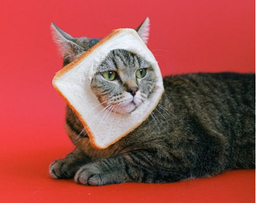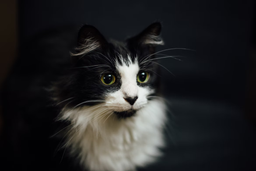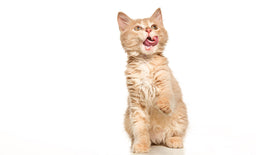How to choose the best cat food for constipation
If you’ve noticed your cat hasn’t been using the litter box lately, they’re most likely suffering from digestive tract issues. Constipation is common in felines of all ages, but especially those approaching the golden years.
The good news is you can spare your cat the discomfort of intestinal blockage with the good old-fashioned combo of diet and exercise. Let’s take a look at the best cat food for constipation and learn how to keep your pet’s gastrointestinal health at an optimal level with tailor-made meals! We will also touch on the most common causes of feline constipation and offer a few tips on preventing it.
Cat constipation diet—can it really help?
When it comes to indoor cats, digestive tract problems are pretty common. Intestinal blockage can sometimes indicate a more serious condition, but it’s usually no cause for alarm. Some breeds are more susceptible than others, but overall, most felines will experience gastrointestinal issues, such as diarrhoea, constipation, and vomiting throughout their lives.
While genetics and undiagnosed illnesses can cause stomach problems, your cat’s lifestyle, i.e., their diet and daily activities, are the deciding factors. What your pet eats during the day and in what amounts will influence almost every aspect of their life, including their bowel movement.
The most effective cure for feline constipation is a well-balanced diet based on animal protein and fibres. You should exclude hard-to-digest food items and ingredients like milk and cheese from their meals. If you have an elderly cat, your vet may recommend additional treatment like over-the-counter stool softeners and dietary supplements. Keep in mind that kittens and adult cats are also no strangers to constipation.
What's the best food for cats with constipation?
If your feline companion is struggling to poo (or not going at all), they most likely lack the following in their diet:
- Water
- Animal protein
- Fibre
Cats don’t drink a lot because they prefer fresh, running water to stale water from the bowl. Without proper hydration, their digestive tract can’t function properly, resulting in constipation. High-quality wet and semi-moist cat food typically have a high moisture content that sustains regular bowel movement. You can also increase their water intake by preparing homemade meals like soup and broth.
Besides water, canned food usually contains:
- Animal proteins—The meat in canned goods provides the necessary micronutrients, such as taurine, that sustain your cat’s:
- Gastrointestinal health
- Eye function
- Heart and liver function
- Reproductive health
- Metabolism
- Healthy fats—Tiny amount of fat is a viable energy source, helping your feline companion stay active
- Necessary vitamins and minerals—High-quality wet cat food is rich in natural vitamins and minerals (e.g., potassium, vitamin B complex, zinc, etc.) that contribute to your feline’s overall health
As for fibres, the best way to introduce them to your pet’s diet is with healthy fresh treats. You can feed them tiny amounts of certain vegetables and cat grass until their digestive health stabilises. Here’s what fibre sources are safe for felines:
- Pumpkin and pumpkin powder
- Carrots
- Asparagus
- Broccoli
- Cucumber
- Apples
- Cantaloupe
- Whole grain
Studies have shown that fibre, especially soluble fibre in apples and grain, absorbs water from the stomach and intestines, so you should talk to your vet before adding any of the above-listed items to your cat’s meals. Overconsumption can cause dehydration, which affects the digestive and urinary health, resulting in obstipation and even bladder stones and cystitis in rare cases.
Dry cat food for constipation—friend or foe?
Can dry biscuits soothe your cat’s sensitive stomach? It depends on the food type and portion size. Some pet stores sell dry cat food for constipation with special probiotic supplements meant to assist bowel movement. A few dry biscuits combined with high-quality wet food shouldn’t do your pet any harm.
Kibble is also more affordable than canned food and may help with the following health conditions:
- Dental disease—As cats nibble on dry biscuits, the excess plaque is removed, preventing dental issues, such as gingivitis
- Malnutrition—If your cat suffered an unhealthy weight loss, it’s better to give them downsized portions of dry biscuits and gradually increase the amounts. Dry cat food is rich in carbohydrates, so small servings can help them reach a healthy weight
The high-calorie content and lack of moisture in cat kibble are more likely to cause than cure constipation. Unless your pet is recovering from malnourishment, you should stick to canned products to provide proper hydration and essential nutrients to your feline.
What to feed your constipated kitten
Since a kitten’s digestive tract is still developing, the little pawsters can go days without visiting the litter box, especially if they haven't started weaning yet. The irregular bowel movement makes it hard for cat parents to notice something’s wrong.
If your kitten refuses to eat, loses interest in playing, and feels sick after feeding, they may suffer from digestive issues. The most common causes of kitten constipation include:
- Dehydration
- Hairballs
- Lack of stimulation
- Parasites
You should try increasing your kitten’s water intake by giving them high-quality canned goods along with the kitten replacer formula. If they’re too young to eat solids and their mother isn’t present, try stimulating their tummy with light massages to induce bowel movement. Remember to give them plenty of fresh water between meals.
Proper nutrition will strengthen the kitten’s digestive tract and potentially diminish the formation of hairballs.
In some cases, intestinal blockage is caused by worms and other parasites. The tell-tale signs of a parasitic infection are:
- Vomiting
- Diarrhoea
- Below average weight
- Lethargy
- Bloated belly
- Dullness of fur
If you suspect that’s what’s causing the obstipation, consult your vet for further treatment.

Daily cuddles are the best remedy for an upset tummy!
Source: Jonathan Fink
Untamed’s best cat food for constipation
Untamed products offer the perfect balance of moisture and nutrients to improve your cat’s gastrointestinal health! Our food is made with:
- Hypoallergenic ingredients—We have a strict policy of no additives, food colouring, or other potentially harmful ingredients in our products to reduce the risk of allergic reactions and digestive issues
- Premium whole meat cuts—Untamed products are made with high quality, human-grade meat cuts, providing twice the amount of protein and amino acids per meal than most cat food manufacturers
- Vet-designed formulas—Because our recipes are created with the help of veterinarians (and avid cat lovers), your feline will get perfectly balanced meals in terms of health and taste
- Sustainable production—We work hard to reduce our carbon pawprint and protect the environment we share with our four-legged friends and other species! All our meat is ethically-sourced, and we use recyclable materials for the packaging
If you’d like to learn more about our products, take a quick online quiz, and we’ll suggest a detailed meal plan for your feline companion!

Our ingredients are gently cooked, maintaining the optimal nutritional value!
Image (c) Untamed
Here’s a preview of our most popular recipes!
Besides being nourishing, Untamed recipes are also super tasty and irresistible to even the pickiest eaters. Here are some popular gravy and jelly formulas:
- Tuck-in Tuna—tuna whole meat, fish broth
- Chocka Chicken—chicken breast, chicken broth, chicken liver
- Full-on Fishy in Gravy—tuna whole meat, fish broth, sardine, mackerel
- Chocka Chicken with Duck in Jelly—chicken breast, chicken broth, duck
If you want to give our products a go, fill out our online questionnaire, and we will prepare a personalised menu for your feline companion. Tell us about your pet’s age, food preferences, or sensitivities and order a cat food trial pack at a special price with no additional shipping fees! If your kitty okays the meals, we can deliver them to your door regularly.
Our cat food delivery service is highly efficient—you can expect the goods will arrive every month around the same date. You can also pause, skip, or change the order from your account whenever you like.

Untamed’s Chocka Chicken in Jelly is pawsitively scrumptious and great for the tummy!
Image (c) Untamed
How does the Untamed diet affect your cat?
The delicate balance of hypoallergenic ingredients, high moisture content, and animal protein will soothe your cat’s stomach and help clear the obstruction. Besides offering immediate relief, the Untamed diet will optimise your feline companion’s gastrointestinal health in the long run!
Check out the table below for an overview of the long-term benefits:
|
Timeline |
The Untamed effect |
|
Within a week |
● Regular bowel movement ● Healthy stool ● Increased energy |
|
After two months |
● Improved digestive tract function ● Optimal hydration ● Decreased shedding ● Shinier and thicker fur |
|
Within four months |
● Fewer hairballs ● Optimal weight and muscle tone ● Stable digestive health |
|
Long-term health benefits |
● Fewer gastrointestinal issues ● Stronger immune response ● Improved heart and kidney function ● A happy cat with healthy eating habits! |
Harmful food for constipated cats
The feline natural diet is entirely carnivorous, meaning your cat’s stomach is designed to process meat. The following items are harmful to healthy cats, let alone those suffering from digestive problems:
- Caffeine—While a cup of java may have you running to the loo, caffeine-based products like chocolate, coffee, and tea won’t help your constipated cat and can even lead to caffeine poisoning
- Allium vegetables—Onions, garlic, and chives can affect your cat’s kidney function. Vegetables are generally not the best food for constipated cats, bar the occasional high-fibre treat. Including certain veggies in your pet’s meals is fine, but an exclusively vegan diet is not an option
- Fruit—Grapes, raisins, and citrus fruit are known to cause kidney problems if consumed excessively. Does that mean all fruit is forbidden? Not really—you can treat your feline companion to tiny pieces of seedless watermelon and cat-friendly fruits, such as strawberries, apples, and bananas but not more than once a week
- Dough—Raw yeast and dough are hard on the feline stomach and can lead to severe gastrointestinal issues
- Raw meat and eggs—Cats are hunters at heart, so they’re bound to snag an unlucky mouse from time to time which is perfectly fine. If it’s not a fresh kill, raw food is potentially dangerous because it contains various harmful bacteria
What are the symptoms of cat constipation?
The apparent sign of constipation is an empty litter box. If your cat hasn’t gone to the toilet for over 36 hours, they most likely suffer from obstipation.
Keeping track of your pet’s restroom routine can be tricky, which is why constipation is difficult to diagnose at first. Your cat may still be able to poo a little despite digestive issues. You should be on the lookout for other symptoms of constipation, such as:
- Hard, dry, and small droppings
- Hard or bloated abdomen
- Straining on the litter box
- Loss of appetite
- Hunching over and walking stiffly
- Nausea and vomiting
Even if you miss the signs mentioned above, you’ll be able to tell your cat is in discomfort. They may be going in and out of the litter box while meowing profusely.
You should increase your pet’s water intake and get them on a high-protein diet for constipated cats. Contact your vet for further guidance if the symptoms don’t disappear after a few days.
How to treat (and prevent) cat constipation
Over-the-counter laxatives are the typical treatment for cat constipation. If the feline is in severe discomfort, the vet can administer an enema for instant relief.
Various home remedies can help prevent future obstructions and increase your pet’s bowel mobility. It mostly boils down to lifestyle changes, so you can:
- Switch to a diet for constipated cats—Avoid products made with starch or rich in carbohydrates. Replace vegetable protein with bioavailable animal ingredients. Try not to share your plate with your pet because most “human food” is hard for them to digest
- Increase their daily water intake—Cats are often put off by water bowls and can become dehydrated as a result. Make sure they get enough water during the day by running the tap or allowing them to drink from your mug
- Give them natural stool softeners—Try giving your cat tiny bits of food rich in natural probiotics and fibre, such as:
- Olive oil
- Pumpkin
- Yoghurt
- Manage their weight—Feline obesity can cause lowered gastrointestinal mobility. Your chunky cat will need to lose a few pounds to restore regular bowel movement
- Have them exercise regularly—An active cat is a healthy cat! Constipation is often a result of a sedentary lifestyle, so regular exercise is necessary. If you have a Garfield on your hands, try using stimulating toys and other props to prompt them to play
- Change the litter box—Your feline companion needs to poo elegantly. If they dislike the shape and size of the litter tray, they might refrain from going. Experiment with different models until you strike gold
- Maintain a stress-free environment—Cats are creatures of habit, and they need a stable environment to thrive. If their routine was suddenly disrupted (e.g., you moved houses), they can become anxious and develop psycho-somatic conditions, such as constipation

An active cat is a healthy cat!
Source: Jeremy Bezanger
The most common causes of bowel obstruction in cats
Constipation is usually a consequence of:
- Inadequate diet
- Lack of exercise
- Feline obesity
- Hairball accumulation
- Pelvic injury
- Ingestion of a foreign body
Note that bowel obstruction is also an accompanying symptom of certain digestive tract diseases (e.g., colon cancer), which is why you should pay attention to your cat’s litter box. To establish there’s no cause for alarm, you need to examine the shape and consistency of their stool.
A healthy cat’s faeces are brown, well-formed, and wet enough for the litter to stick to them. Anything else is considered abnormal. Check out the table below for further reference:
|
Stool appearance |
Likely cause |
|
Small, hard, and dehydrated faeces |
Megacolon or severe dehydration |
|
Small and hard droppings with entangled hair |
Hairballs and over-grooming |
|
Thin and shaped like a ribbon |
Gastrointestinal disease |
What is megacolon, and how to treat it?
Megacolon is a medical term for the dilation of a feline's colon. When it occurs, the organ can expand up to three times its normal size. The stretched muscles of the colon are unable to contract and push the excrement out of the digestive tract, resulting in an obstruction. It’s one of the more common causes of constipation in cats.
The condition can be brought upon by:
- Spinal cord injury
- Foreign body ingestion
- Hairball accumulation
- Strictures
In case the exact cause remains unidentified, the correct term for the condition is idiopathic megacolon. It’s pretty common in senior cats but can also happen to younger felines.
The clinical signs of an enlarged colon are:
- Straining and painful pooing
- Decreased appetite and weight loss
- Lethargy
- Nausea and vomiting
- Tender abdomen
The most accurate way to diagnose megacolon is with a thorough physical examination of both the abdomen and the rectum. Your vet will run a series of tests, including X-rays, ultrasound, and a colonoscopy. They’ll most likely take blood and urine samples as well.
For treatment, your cat will probably have to take stool softeners and laxatives. In addition to medication, your vet will also recommend a special cat constipation diet rich in fibre, moisture, and animal protein.
In more advanced cases of idiopathic megacolon, the organ is removed in a surgical procedure called subtotal colectomy. The aftermath of the intervention is increased bowel movement (approximately two to three times per day) and softened stool. Since the anal sphincter isn’t affected by the surgery, your cat won’t lose their faecal control.

![Best food for Ragdoll cats in the UK [Broken Down]](http://untamed.com/cdn/shop/articles/featured_best_food_for_ragdoll_cats_uk.jpg?v=1646818249&width=256)

